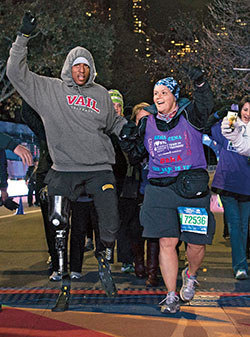 |
(Photo: Paul W. Lee/IMB) |
Somewhere around mile 25 of the New York City Marathon, Gena Wilson was surprised to see a bent figure emerge from the darkness.
A two-time survivor of non-Hodgkin’s lymphoma, Wilson had part of her spine removed in 2011 and when the cancer returned to her brain in 2013 had been told that she was dying. But she didn’t die; instead, she began walking marathons. This one had proved difficult even for elite runners, with cold temperatures and wind gusts that reached 50 mph over the Verrazano Bridge. Wilson crossed the starting line at 10:55 a.m. with the last wave. By the time she got to the first watering station, the workers were already packing up. �I thought there would be more walkers, but by the time I got off the bridge, I hadn’t even walked a mile, and I was completely by myself,� she tells me. �I’m thinking, �I have 25 more miles of nobody.’ �
What Wilson didn’t know was that, only just ahead of her, Cedric King was struggling to stay in the race. Fighting with the Army’s 82nd Airborne Division, King had lost both his legs when he stepped on an IED in Afghanistan. Nine months later, he watched footage of the Boston Marathon bombing from Walter Reed Hospital, where he was still undergoing surgeries and had just received his first set of running prosthetics. �At the time I could only run 50 yards,� King says. �But I thought, �If I run this marathon next year, then I could do more to help those people than anything I could say out of my mouth.’ They could take away their own interpretations of recovery and resilience.� This past spring, less than two years after King lost his legs, he �completed the Boston Marathon in seven and a half hours.
But in New York, King was having problems with his new prosthetics. He started the race almost an hour after his official 9:40 a.m. start time because at the last minute he’d taken the tops off his walking prosthetics and jerry-rigged them to the bottom of his running ones with an Allen wrench borrowed from a firefighter. Still, he was in pain, and the winds made it that much harder to keep his balance. �To be honest with you,� he says, �I was terrified.� King was only at mile eight when workers started pulling up the mile markers, so he couldn’t even tell how far he’d gone, or how far he still had to go. �And there’s a part of me that’s saying, �What’s the use of continuing if the end of the race is already here? Why not just quit?’ I thought I was the last person.�
King made it to the Queensboro Bridge before the sweep bus came along, picking up any stragglers who were �bowing out of the marathon but still wanted to get their stuff at the finish line. King felt depleted, but he couldn’t bring himself to get on. Instead he prayed. �I don’t care how long it takes or how cold I get,� he told his two guides. �I’m going to finish.�
By the time King got to mile 25, night had descended and it was getting even colder. When he took his prosthetics off to briefly rest, he saw that sweat had pooled in them and frozen to sludge. But then he saw a woman approach. �Hi, I’m Gena,� she said in her friendly South Carolina twang. King looked up at her, stood, then put his arm around her. �Come on,� he said. �Let’s go.� Arm in arm, they started walking.
�What made you decide to do the marathon?� King asked somewhere between miles 25 and 26.
�Well, God,� Wilson replied. �God chose to heal me. I shouldn’t even be here. Part of it is just showing the world: �Look at the amazing thing God can do.’ � She looked over at him. �What made you decide to do it?�
�Well, kind of the same reason,� King said. �I shouldn’t be here either.�
�You want to show the world what you’re made of?� she asked.
�No,� he answered. �I want to show the world what God made of me.�
They crossed the finish line at 8:28 p.m., with their arms around each other. The race had technically ended; no official times would be posted for Wilson and King. But it didn’t matter. The lights were still on, the archway that said finish line was still there, and they had completed the New York City Marathon together. �The people around you have so much to do with you coming through challenges,� says King. �They really do.�